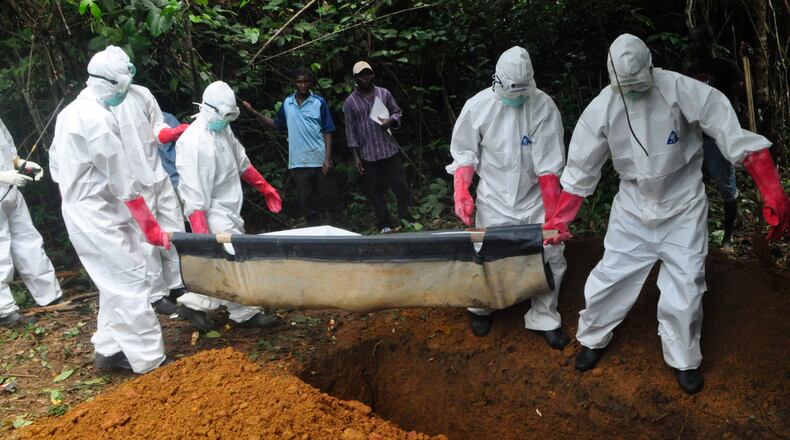In this Saturday photo a burial team in protective gear bury the body of a woman suspected to have died from Ebola virus in Monrovia, Liberia. The disease has ravaged a small part of Africa, but the international image of the whole continent is increasingly under siege. AP /Abbas Dulleh
Hat tip to PeachPundit.com for the latest news out of Monrovia, Liberia. From FrontPageAfricaOnline.com:
All was set for the trip as the college had already purchased a round trip plane ticket and made hotel reservations for the journalist's visit when it was forced to cancel last minute to time because of fear she could get sick while visiting the US thereby exposing students to the deadly Ebola virus.
The McGill Lecture, which is free and open to the public, is sponsored by the Grady College of Journalism and Mass Communication and will be held October 22 at 4:PM in Room 250 of the Miller Learning Center but with a new speaker Antonio Mora, a prominent Hispanic journalist who is a two-time winner of the Peabody Award.
"I received a call from Georgia just days before my trip. A woman with a pleasant voice delicately told me that parents were panicking and the general public was against my coming to the university," stated Williams in a blog post published days after the university reached the decision.
The UGA decision, of course, is far from isolated. The topic gets a more thorough treatment in this dispatch from the Associated Press:
Guinea, Liberia and Sierra Leone — the African countries afflicted by the Ebola outbreak — have a combined population of about 22 million on a continent with more than 1 billion people. Their corner of West Africa encompasses an area the size of California, or almost as big as Morocco. Yet the epidemic feeds into a narrative of disaster on a continent of 54 countries that has seen some progress in past years, and false perceptions of Ebola's reach are hurting African business distant from the affected areas.
"It speaks to a whole discourse about the danger of Africa," said Michael Jennings, a senior lecturer in international development at the School of Oriental and African Studies in London.
He cited the recent decision of a British school to postpone a visit by a teacher from the West African country of Ghana after parents expressed concern about the Ebola virus. Ghana does not border the hard-hit nations and has not reported any cases of the disease.
Jennings said fearful people don't necessarily react in a rational way and the message of some comments on social media in Britain is: "Why don't we just stop everyone in West Africa from coming?"
Africa has had a troubled image. Famine in Ethiopia, chaos in Somalia and genocide in Rwanda drove the idea of a continent in perpetual crisis. In recent years, though, an end to a number of wars and ensuing stability and growth pointed to a turnaround that some enthusiasts dubbed "Africa Rising."
Now the economic impact of Ebola fears is being felt in many parts of Africa. Hotels, tourism operators and conference organizers are recording increasing cancellations.
Thirty international buyers pulled out of an annual tourism expo that began Thursday in Zimbabwe's resort town of Victoria Falls, said Karikoga Kaseke, the national tourism agency chief. He said business travelers from China and Malaysia were among those who recently canceled trips, and Jamaican musicians have also skipped Zimbabwean shows.
The southern African country is more than 4,800 kilometers (3,000 miles) from Ebola-hit Liberia, or about twice the distance between London and Moscow.
In the U.S. state of Mississippi, a middle school principal has taken a week of vacation in an attempt to allay parents' fears about Ebola after he returned from a trip to Zambia, another southern African nation without any reported Ebola cases. In Pennsylvania, two high school soccer coaches resigned last week after their players hurled Ebola taunts at an opponent from West Africa.
Soccer players on Sierra Leone's national team have been treated as Ebola risks in African Cup qualifying games even though none of the squad lives in Sierra Leone because they play for clubs in Europe and elsewhere. Opponents have sometimes refused to shake the hands of the Sierra Leoneans or swap shirts — a soccer tradition after a game — because of fears of catching the deadly virus.
U.N. High Commissioner for Human Rights Zeid Ra'ad Al Hussein has warned against "a mentality that locks people into rigid identity groups and reduces all Africans — or all West Africans, or some smaller, national or local group — to a stereotype."
Jens David Ohlin, a professor at Cornell Law School in the United States, said discrimination was a concern as states seek to prevent the Ebola virus from entering their borders, but he warned against "oversensitivity to discrimination that will prevent governments from appropriately dealing with the situation."
The early international response to Ebola's spread, described by some as slow, is linked to its location, according to Ohlin.
About the Author
The Latest
Featured




